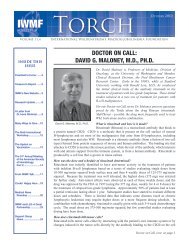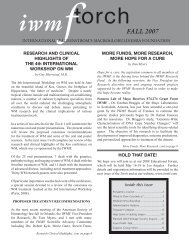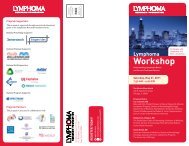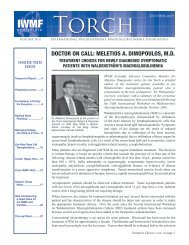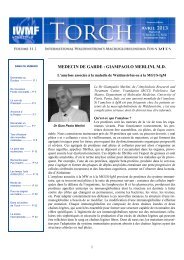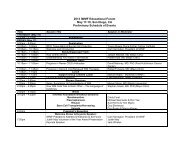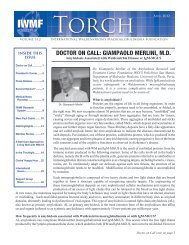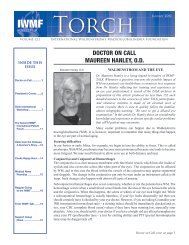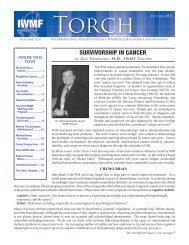English - International Waldenstrom's Macroglobulinemia Foundation
English - International Waldenstrom's Macroglobulinemia Foundation
English - International Waldenstrom's Macroglobulinemia Foundation
Create successful ePaper yourself
Turn your PDF publications into a flip-book with our unique Google optimized e-Paper software.
MEDICAL NEWS ROUNDUP<br />
by Sue Herms<br />
The Leukemia & Lymphoma Society Increases Benefit<br />
for WM Patients – The Leukemia & Lymphoma Society has<br />
announced that, effective February 1, 2010, patients with WM<br />
and multiple myeloma will be able to receive up to $10,000<br />
in support to help offset the costs of prescription drug copays<br />
and other insurance related expenses. This increase is<br />
retroactive for expenses incurred from July 1, 2009 through<br />
June 30, 2010, and is available to new and currently approved<br />
patients. Patients, caregivers, and healthcare professionals<br />
may submit applications online at www.lls.org/copay.<br />
Applications can also be submitted by calling 877-557-2672.<br />
Eligibility will be determined by medical and financial need.<br />
United Kingdom Study Highlights Importance of T-Cell<br />
Response in Lymphoma – An important factor in cancer<br />
progression is the ability of tumor cells to evade recognition<br />
by the body’s immune system. A multi-center study in the<br />
United Kingdom identified a defect in T-cells of patients with<br />
follicular lymphoma and diffuse large B-cell lymphoma, called<br />
T-cell immunologic synapse dysfunction, which suppresses<br />
T-cell numbers and activity by reducing the expression of<br />
certain T-cell proteins. This defect is induced after short-term<br />
contact with tumor cells. The study also demonstrated that<br />
lenalidomide (Revlimid) was able to repair this defect. These<br />
results highlight the importance of identifying treatments for<br />
repairing T-cell responses in lymphoma.<br />
Stanford University Reports on Side Effects of Rituximab<br />
Treatment Following Autologous Stem Cell Transplant –<br />
Rituximab has been administered after autologous stem cell<br />
transplantation for B-cell lymphomas with the goal of eradicating<br />
any residual disease that may be present. Stanford University<br />
School of Medicine researchers previously reported that two<br />
courses of rituximab after transplantation had encouraging<br />
clinical outcomes; however, neutropenia (abnormally low<br />
numbers of neutrophils) occurred in 52% of treated patients. The<br />
researchers determined that the Fc RIIIa gene polymorphism on<br />
the patients’ effector cells (macrophages, neutrophils) predicted<br />
the occurrence of the neutropenia. Those who had the amino<br />
acid valine at position 158 of this polymorphism correlated with<br />
a higher incidence of neutropenia. Testing for this polymorphism<br />
in transplant patients should be able to identify a high-risk<br />
population for neutropenia following rituximab treatment.<br />
Second Generation Oral Proteasome Inhibitor Begins<br />
Phase I Trial – Millennium Pharmaceuticals has initiated<br />
a Phase I clinical trial in multiple myeloma patients for<br />
an oral formulation of MLN9708, a second-generation<br />
proteasome inhibitor. Millennium developed bortezomib<br />
(Velcade), currently FDA-approved for the treatment of<br />
multiple myeloma and relapsed mantle cell lymphoma and<br />
increasingly used for the treatment of WM.<br />
Results Reported for Phase II Study of Perifosine in<br />
WM – Dana-Farber Cancer Institute recently reported results<br />
from a Phase II study of oral perifosine in 37 relapsed/<br />
refractory WM patients. A minimal response was achieved<br />
in 35% of patients, while 54% showed stable disease. The<br />
median progression-free survival was 12.6 months. The most<br />
common adverse events were cytopenias, gastrointestinal<br />
symptoms, and arthritis flare.<br />
Multi-Center Study Investigates Anti-Interleukin 6<br />
Monoclonal Antibody in Multiple Myeloma – A multicenter<br />
study reported in Clinical Cancer Research<br />
has investigated the anti-multiple myeloma activity of<br />
monoclonal antibody 1339, a fully humanized antiinterleukin<br />
6 antibody, alone and in combination with other<br />
multiple myeloma treatment agents. When tested on cell lines<br />
and in mouse models of multiple myeloma, the antibody<br />
significantly inhibited the growth of multiple myeloma cells.<br />
It also enhanced the action of dexamethasone, bortezomib,<br />
lenalidomide, and perifosine.<br />
Pomalidomide/Dexamethasone Combination Benefits<br />
Patients with Relapsed Multiple Myeloma – Combination<br />
pomalidomide (a newer immunomodulatory agent) and<br />
dexamethasone therapy has demonstrated a response rate<br />
of 63% in a Phase II trial in patients with relapsed multiple<br />
myeloma. Researchers at Mayo Clinic have treated an<br />
additional group of patients who were resistant/refractory<br />
to lenalidomide, a drug in the same class as pomalidomide.<br />
Both pomalidomide and dexamethasone were administered<br />
orally. Twenty six percent of patients in this trial had a<br />
partial response, while 53% had stable disease. With a<br />
median follow-up of four months, 65% remain progression<br />
free. Pom/dex appears to offer benefit to patients who have<br />
relapsed after other previous therapies.<br />
Vitamin D Shortage May Adversely Impact Survival in<br />
Lymphoma – A shortage of vitamin D may adversely impact<br />
survival in lymphoma patients, says a report presented at<br />
the recent December meeting of the American Society of<br />
Hematology. From 2002 to 2008, researchers analyzed blood<br />
samples from 374 newly diagnosed patients with diffuse<br />
large B-cell lymphoma. Half of these patients were deficient<br />
in vitamin D at the start of treatment. During follow-up,<br />
these vitamin D-deficient patients were twice as likely to die.<br />
All patients received standard treatment, and the researchers<br />
accounted for differences between groups in age and other<br />
factors that might bias the comparison. While the minimum<br />
healthy blood levels of vitamin D have traditionally been<br />
defined at 25-30 ng/ml, others suggest that the level should<br />
be 40 ng/ml. More study is needed before supplementation<br />
of vitamin D is routinely ordered for lymphoma patients.<br />
Although fortified foods provide some vitamin D, these may<br />
Medical News Roundup, cont. on page 10<br />
IWMF TORCH Volume 11.2<br />
9



